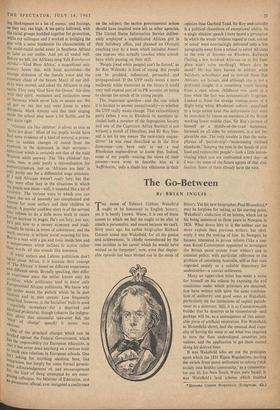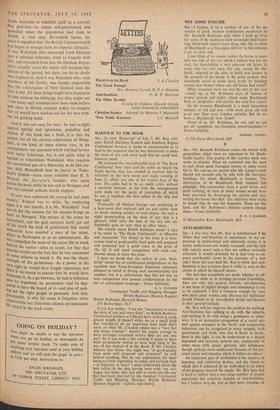The Go-Between
By BRIAN INGLIS THE name of Edward Gibbon Wakefield ought to be honoured in English history; yet it is barely known. Worse, it is one of those names to which we feel we ought to be able to attach a personality, and resent because we can't. Sixty years ago, his earlier biographer Richard Garnett noted that Wakefield, for all his genius and achievement, 'is chiefly remembered by the one incident in his career which he would have wished to be forgotten'; now, even that deplor- able episode has been blotted out in the mists of history. Yet his new biographer, Paul Bloomfield,* may be forgiven for taking, as his starting point, Wakefield's abduction of an heiress, which led to his being sentenced to three years in Newgate in 1826. What drove him to it the author can no more explain than previous writers; but obvi- ously it was the making of him. In Newgate he became interested in prison reform (like a one- man Royal Commission appointed to investigate the British penal system from within') and in colonial policy, with particular reference to the problem of colonising Australia, still at that time regarded mainly as a suitable depository for undesirables—a convict settlement.
Many an upper-class felon has made a name for himself on his release by exposing the evil conditions under which prisoners are detained; few have written with quite the same combina- tion of authority and good sense as Wakefield, particularly on the limitations of capital punish- ment as a deterrent. Still, it is as Commonwealth builder that he deserves to be remembered—and perhaps will be, as a consequence of this admir- able piece of artificial respiration. For Wakefield, as Bloomfield shows, had the unusual dual capa- city of having the sense to see what was required to turn the then undeveloped countries into nations, and the application to get them started along his desired lines.
It was Wakefield who set out the principles upon which the 1831 Ripon Regulations, starting the switch from penal settlement to colony ('sick society into healthy community,' as a commenta- tor put it), for New South Wales were based. It was Wakefield's land scheme which enabled 61 EDWARD GIBBON WAKEFIELD. (Longmans. 42s.) South Australia to establish itself as a convict- free province—to which self-government was Promised when the population had risen to 50,000; a vital step, Bloomfield insists, be- cause it signalled that 'the British Commonwealth had begun to emerge from its imperial chrysalis.' It was Wakefield who converted Lord Durham into a colonial reformer, went to Canada with him, and extracted from him the Durham Report (who actually wrote the report still intrigues his- torians of the period, but there can be no doubt Who inspired it). And it was Wakefield who, with Members of his family, was mainly responsible that the colonisation of New Zealand took the lines it did. All these things might have happened lo time without his lobbying; but they might not —too many ugly mistakes have been made before and since in British colonial policy to imagine that all would have worked out for the best with- out his guiding hand.
And it was not easy for him : he had to fight against apathy and ignorance, prejudice and malice. If this book has a fault, it is that the author, for all his obvious admiration of Wake- field, is too kind, at times almost cosy, in his commentary—an approach which will find favour With many historians, but is not quite what is needed to rehabilitate Wakefield, who requires the committed pen of a Macaulay to do him jus- tice. Still, Bloomfield does do justice to Wake- field's friends—none more valuable than R. S. Rintoul, the Spectator's founder, who came across his work while he was still in Newgate, and lent his colonial policies sturdy support.
If ever man redeemed the wrong he had done society,' Rintoul was to write, `by conferring Upon it a vast benefit, it is Mr. Wakefield.' And search for the reasons for his success brings us back to Newgate. The nature of the crime he committed, and the gaol sentence itself, put out of his reach the kind of preferment that would ordinarily have awaited a man of his talent, either in Parliament or as an administrator. He !bias.compelled for most of his active life to work behind the scenes—often in secret, for fear that enemies would use the fact that he was concerned M some scheme to wreck it. He was the classic examPle of the go-between. As a power in his townh right he would have fought opposition, but ere is no reason to assume that he would have overcome it. As a go-between, he had to influence men by argument, by persuasion; and he hap- pened to have the knack of it—and also of seek- ing out the right people to persuade. And that, Presumably, is why his name is forgotten when Innumerable less illustrious citizens are honoured. He stayed in the back room.



































 Previous page
Previous page